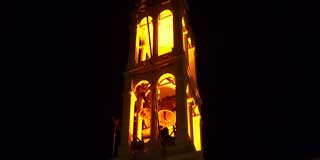Skiathos lies in the Sporades chain in the north-western Aegean, measuring five miles long by nine miles wide.
Skiathos is the smallest but most cosmopolitan island of the Sporades group.
It presents an ideal combination for leisure and sea sports. There are more than 60 beautiful beaches with golden sand or white pebbles and a turquoise sea to swim or sail in, forests of pine and olive trees to walk through and isolated chapels and monasteries to visit.
All around the island there are numerous restaurants and cafes.
Evening entertainment is provided by a remarkable number of restaurants, bars and clubs.
Skiathos is the smallest but most cosmopolitan island of the Sporades group.
It presents an ideal combination for leisure and sea sports. There are more than 60 beautiful beaches with golden sand or white pebbles and a turquoise sea to swim or sail in, forests of pine and olive trees to walk through and isolated chapels and monasteries to visit.
All around the island there are numerous restaurants and cafes.
Evening entertainment is provided by a remarkable number of restaurants, bars and clubs.
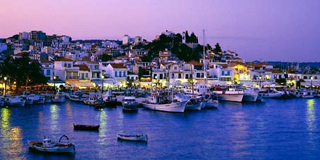
Skiathos is one of the few Islands in Greece that has never changed its name. It is not certain where the name comes from but one theory is that it comes from the Greek word for shadow “skia” because of the many trees or that the Island lies in the shadow of the mountains of Pelion. The Island has a long tradition of shipbuilding and together with the fertile soil it became an important resting place for travellers. It is believed that both the Greek fleet against Troy and Jason and the Argonauts stopped here before sailing on.
In the 7th century BC the Chalceids settled here and the Island became a strategically important place during the Persian Wars. In the next few centuries, following the end of the Persian threat, Skiathos fell under Athenian, Spartan and Macedonian rule while n the 2nd century BC, Phillip III ransacked the Island in order to prevent the invading Romans from getting the Islands riches.
The Island enjoyed relative freedom during Roman and Byzantine times until the Venetian Ghisi brothers took over in the 13th century.
During the Medieval Ages, Skiathos was suffering from constant pirate raids, forcing the islanders to move to Kastro where they did their best to protect themselves spending days huddled on the rocks. The final blow came in 1538 when the Turks invaded the island. After defending themselves for a week the Skiathions could no longer resist and the Turks stormed into Kastro killing many Men, Women and Children.
The liberation of Skiathos began with the Greek revolution in 1821.
In 1823 the Turks attempted to retake the Island but were utterly defeated.
In 1829, after the signing of the Protocol of London, on which was based the founding of the Greek state - which, however, remained tributary to the Sultan the inhabitants of Skiathos abandoned the Kastro and resettled along the harbour, where the ancient town had stood.
In the 7th century BC the Chalceids settled here and the Island became a strategically important place during the Persian Wars. In the next few centuries, following the end of the Persian threat, Skiathos fell under Athenian, Spartan and Macedonian rule while n the 2nd century BC, Phillip III ransacked the Island in order to prevent the invading Romans from getting the Islands riches.
The Island enjoyed relative freedom during Roman and Byzantine times until the Venetian Ghisi brothers took over in the 13th century.
During the Medieval Ages, Skiathos was suffering from constant pirate raids, forcing the islanders to move to Kastro where they did their best to protect themselves spending days huddled on the rocks. The final blow came in 1538 when the Turks invaded the island. After defending themselves for a week the Skiathions could no longer resist and the Turks stormed into Kastro killing many Men, Women and Children.
The liberation of Skiathos began with the Greek revolution in 1821.
In 1823 the Turks attempted to retake the Island but were utterly defeated.
In 1829, after the signing of the Protocol of London, on which was based the founding of the Greek state - which, however, remained tributary to the Sultan the inhabitants of Skiathos abandoned the Kastro and resettled along the harbour, where the ancient town had stood.
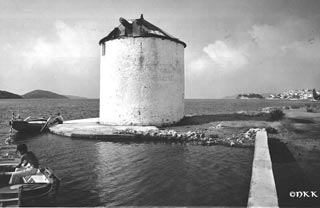
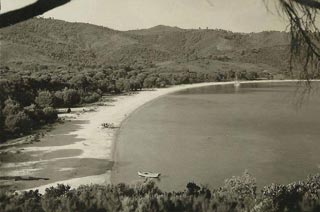
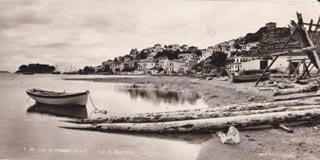
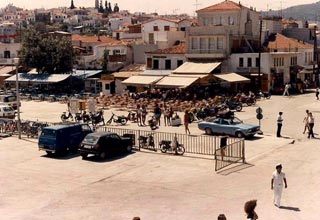
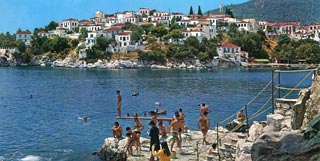
The island's strategic position was decisive for its fate in antiquity.
During Xerxes' campaign three Greek triremes were anchored here, ready to confront the Persian fleet. Skiathos was colonised by lonians and later by Chalkidians it became a member of the Atheian League (477 BC) and for a short period belonged to the Macedonians, later to the
Romans and then reverted to the Athenians
(199-221 AD).
Under the Latins it became apossession of the Ghisi family (1207-1454). In 1537 it was sacked by Barbarossa and was captured by the Turks in the following year.
During the Revolution the ships of Skiathos
played their part and the island was liberated
in 1823. In 1829 the fortified Kastro was aban-
doned and its inhabitants settled in the pres-
ent town, on the site of the ancient city.
In 1851 the great Greek novelist Alexandros Pa-
padiamantis, the "saint "of Greek letters, was
born here in a house close to the harbour, now
a museum in his memory.
Another famous short-story writer, Alexandros Moraitidis, also hailed from Skiathos.
During Xerxes' campaign three Greek triremes were anchored here, ready to confront the Persian fleet. Skiathos was colonised by lonians and later by Chalkidians it became a member of the Atheian League (477 BC) and for a short period belonged to the Macedonians, later to the
Romans and then reverted to the Athenians
(199-221 AD).
Under the Latins it became apossession of the Ghisi family (1207-1454). In 1537 it was sacked by Barbarossa and was captured by the Turks in the following year.
During the Revolution the ships of Skiathos
played their part and the island was liberated
in 1823. In 1829 the fortified Kastro was aban-
doned and its inhabitants settled in the pres-
ent town, on the site of the ancient city.
In 1851 the great Greek novelist Alexandros Pa-
padiamantis, the "saint "of Greek letters, was
born here in a house close to the harbour, now
a museum in his memory.
Another famous short-story writer, Alexandros Moraitidis, also hailed from Skiathos.


